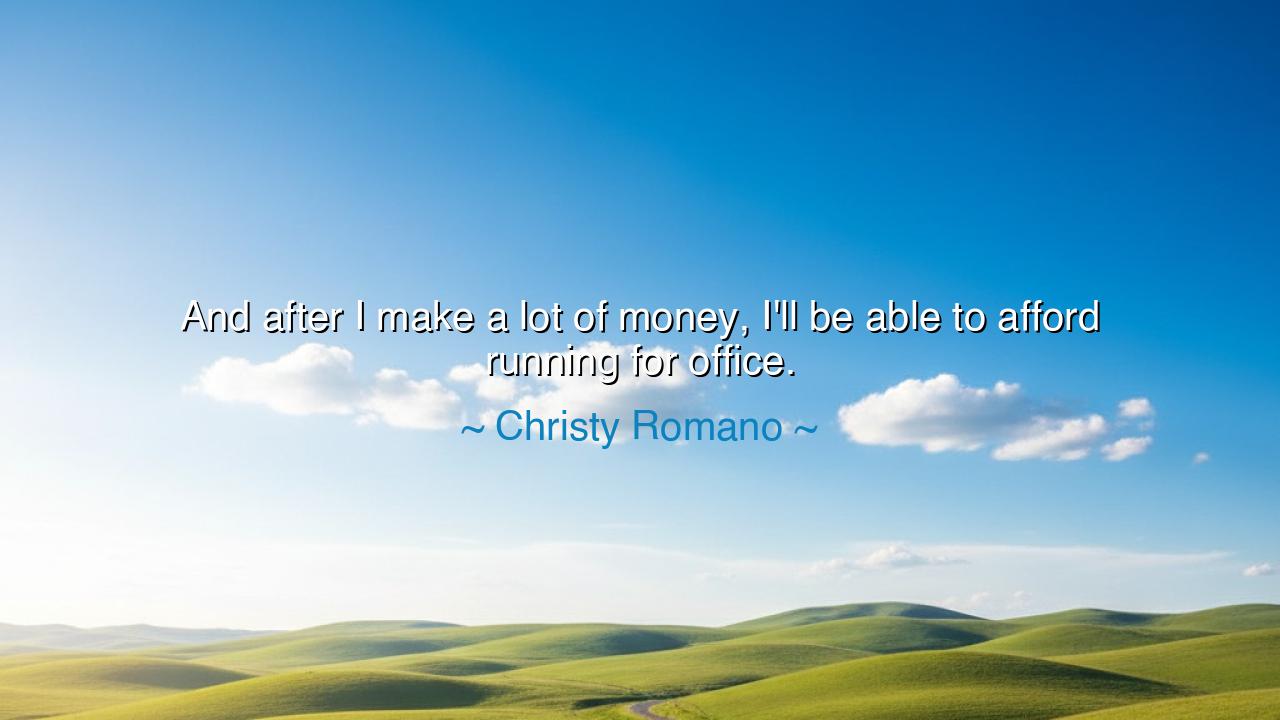
And after I make a lot of money, I'll be able to afford running






The words of Christy Romano, spoken with a mixture of candor and lament, unveil the bitter truth of modern governance: “And after I make a lot of money, I'll be able to afford running for office.” In this saying, she exposes the cruel irony that politics, which should be the domain of wisdom, vision, and service, has been bound by the chains of wealth. To serve the people, one must first pay dearly, not with virtue but with gold. Thus the gates of leadership are guarded not by merit, but by money.
The ancients themselves saw the seeds of this problem. In Rome, though offices were theoretically open to citizens, only the wealthy could truly afford to campaign, to sponsor games, or to buy loyalty through gifts. The voices of the poor were drowned in the clamor of coins. Cicero himself lamented how elections were corrupted, and how ambition became indistinguishable from bribery. Romano’s words echo that ancient warning: that when wealth becomes the price of entry, the true spirit of republican service is betrayed.
Consider the United States in modern times, where elections cost millions—sometimes billions—of dollars. Abraham Lincoln, who once rose from poverty to the presidency, might find no path today without the aid of vast donors. The truth Romano names is that money has become the fuel of campaigns: to speak, to travel, to be heard requires immense resources. Thus, the dream of public service, once open to all with courage, now bends beneath the weight of wealth.
Her words are also a cry for reform. For if leadership is only possible for the rich, then democracy tilts toward oligarchy, and the people lose their truest representatives. The young, the poor, the visionary—those who might carry new fire into the world—are silenced before they begin. Romano’s lament reminds us that the cost of politics is not measured only in dollars, but in the voices lost, the leaders never born, because the price of entry was too high.
Let the generations remember: the noblest call of public office should not be auctioned to the highest bidder. If politics is to endure as the service of all, not the privilege of the wealthy, then the burden of money must be lifted, lest the people be ruled not by their wisest, but by their richest. Christy Romano’s words, though spoken simply, reveal an ancient and eternal truth: that the freedom of a people depends on whether their leaders are chosen by merit—or by money.






GDGold D.dragon
If making a lot of money is seen as a necessary step to run for office, does that mean that only the rich can afford to pursue a political career? What impact does this have on the representation of average citizens? Could this create a system where political power is increasingly concentrated in the hands of the wealthy? What changes need to occur to make the political process more inclusive for all?
LTle thuy
What does it say about the current political climate when a statement like this reflects the reality of campaign financing? Is it fair to say that financial success has become a prerequisite for political involvement? How might this impact the diversity of perspectives in politics, and could we be missing out on qualified candidates who don’t have the financial means to run?
TThyh
Could this statement reflect a deeper issue in politics today—the increasing financial burden of running for office? If candidates need substantial wealth to fund campaigns, does this undermine the democratic principle of equal representation? What would it take to make political office more accessible to people from diverse socioeconomic backgrounds, and is that even possible in our current political system?
NPNguyen Pham
Is it possible that the cost of running for office has become so high that only the wealthy can realistically consider it? If money has become such a barrier to entry, what does that mean for democracy? Should we be concerned that the political system is becoming more exclusive, favoring those with financial resources over ordinary citizens? How do we ensure that anyone with the passion and qualifications can have a shot at running for office?